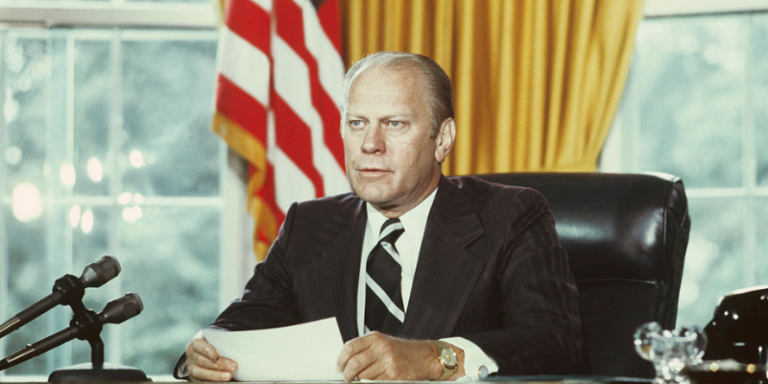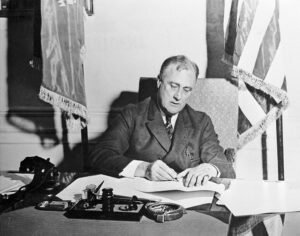Presidential Pardons: What Are They and Who Gets Them?
The president has the power of the pardon – but what does that mean?
By: Kelli Ballard | January 7, 2021 | 383 Words

President Ford reading statement hat he has granted Nixon “pardon.” (Getty Images)
American presidents can issue pardons to anyone who has been convicted of a federal crime, even for treason or murder. Article II of the U.S. Constitution gives a president “power to grant reprieves and pardons for offenses against the United States.” The only real limits on it are that the power cannot be used for immunity to impeachments and a president cannot pardon someone for individual state crimes – those are up to state governors.
History of Presidential Pardons
The idea of a president being able to pardon a prisoner is nothing new. In fact, it has been around since the very first president, George Washington. Not everyone liked the idea of the president being able to pardon people, though. Pennsylvania delegate George Mason was so strongly against giving a president such power that he refused to sign the Constitution.
Pardons – Who Gave Them out and Who got Them

Franklin D. Roosevelt (Getty Images)
Franklin D. Roosevelt currently holds the record of most pardons after issuing 2,819 during his term in office.
After being elected in 1800, Thomas Jefferson pardoned 119 people, many of whom had been convicted under the Sedition Act of 1798 – a law from the previous administration that made it illegal to insult the government. James Monroe and James Madison used their privileges to even pardon pirates. In 1833, Andrew Jackson tried to pardon George Wilson who was facing the death penalty for stealing U.S. mail. For unknown reasons, however, Wilson refused the pardon and was later executed. Since this was the first time anyone had rejected a presidential pardon, the U.S. Supreme Court heard the case and ruled that people can refuse to be pardoned.
In more recent history, Gerald Ford made headlines when he decided to pardon former President Richard Nixon, who had just resigned after the Watergate scandal. The pardon was so unpopular, it has been suggested it had a part in Ford’s 1978 electoral defeat. Bill Clinton was criticized for pardoning Marc Rich in 2001 after it was discovered that Rich’s wife had made large political donations.
President Donald Trump is also receiving backlash for his pardon choices since many of them are former associates; however, as history shows us, this has been the way of presidents since the beginning of America.
















